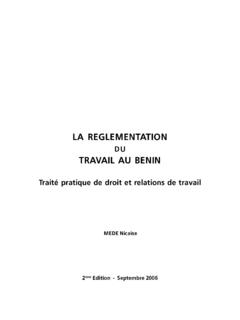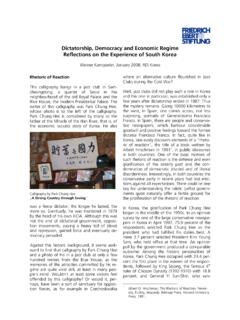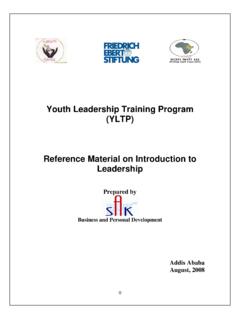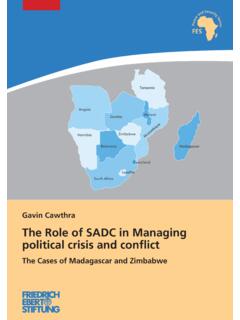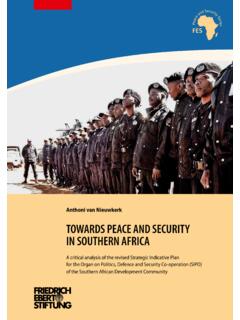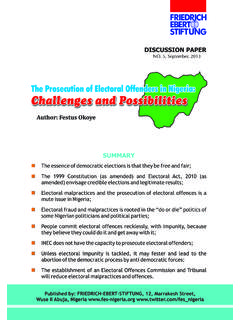Transcription of Trade unions and - Friedrich Ebert Foundation
1 Discussion papersDP/100/1999 LabourandSoc iet yProgr amm Box 6CH-1 21 1 Genev a 22 Tel. 004122/7998496 Fax. 004122/7998542 Email: unionsanddevelopmentHenk Thom asInst it ut e of Social St udiesThe HagueTheInternational Institute for Labour Studies was established in 1960 as an autonomous facility of theInternational Labour Or ganization (ILO). Its mandate is to promote policy research and public discussionon emerging issues of concern to the ILO and its constituents labour, business and and Society Programme examines the outlook for labour at the beginning of the newmillennium in the light of changes at the workplace and in society at large. Focusing initially on organizedlabour,the programm e seeks to identify appr oaches and str ategies to enhance the profile of la bour as amajor actor in civil society, and as a contributor to dynamic and equitablegrowth. Specifically, theprogramme will review the changing environment of labour and unions ; document Trade union responsesto these changes; highlight promising approaches for tr ade unions in civil society and the global economyin future; and outline the type of policy and institutional environment required for the growth of free andeffective Trade unions .
2 This work is undertaken in close collaboration with international and national tradeunion organiza tions and inter national tra de secretariats, and will be implemented through networksconsisting of Trade union practitioners, academics, r esearch institutes and other policy-maker s. T hesenetworks, both interna tional and re gional, will also be a means of disseminating research outcomes to awider Paper Series presents the preliminar y results of research undertaken by the IILS. Thedocuments are intended for limited dissemination with a view to eliciting reactions and comments beforethey are published in their final form in the Research Series or as special pu unionsanddevelopmentHenk Thom asInternational Institute for Labour Studies GenevaCopyright International Labour Organization (International Institute for Labour Studies) 1999 Short excerpts from this publication may be reproduced without authorization, on condition that the sourceis indicated.
3 For rights of reproduction or translation, application should be made to the Editor,International Institute for Labour Studies, P. O. Box 6, CH-1211 Geneva 22 (Switzerland).ISBN 92-9014-608-7 First published 1999 The responsibility for opinions expressed in this paper rests solely with its author, and its publication doesnot constitute an endorsement by the International Institute for Labour Studies of the opinions for this publication should be sent to: IILS Public ations, Internation al Institute for L abour Studies, Box 6, CH-1211 Geneva 22 (Switzerland).TABLE OF CONTENTS1 .Int 12 .Regional labour Latin and Central post-structural adjustment building as best practice .. areas as best practice .. Women, Trade unions and 136 .Concluding observat 181Dr. Henk Thomas is Professor of Labour Studies at the Institute of Social Studies (ISS), The Hague, TheNetherlands. Comments on an earlier draft by Rudy Moonilal, Freek Schiphorst, and Hagen-Koo as well as byparticipants at a workshop organized at the International Institute for Labour Studies (IILS), held in Geneva in December1998, are gratefully rade unions and d ev elopme ntHenk Tho mas11.
4 Int roductionThis paper raises a number of issues which reflect on the role of the labour movement indevelopment processes and broad social transformation, particularly in Asia, Africa, Latin andCentral America. Its objective is to explore a new methodology to analyse the Trade unionmovement in a context which has not been exposed to either the Western European model ofwelfare state involvement or the Anglo-Saxon model of strong collective bargaining. This appearsnecessary since in numerous newly industrialized and/or yet to be industrialized countries labourmarket conditions are such that traditional industrial relations p atterns no l onger offer ef fectiveguidelines for policy design and action. In the specific context of the current IILS research agendathe theme Partnership in development programmes forms part of the broader agenda for unionaction (IILS, 1998, pp. 8-9). The IILS policy design paper for this project approac hes this themein the following manner: The labour movement has a major role to play in sustainable development and participatorydemocracy.
5 Trade unions as a large organized group in civil society can bring a unique contributionto the development community. They are directly involved with economic systems of production anddistribution; they can influence the course and content of employment and social and e conom icpolicies; they are representative and accountable; they have considerable experience in organising themore vulnerable sections of society; and they have the e xperience and stand ing required to accessnational legal systems and public facilities. They can contribute through their long-standingrelationships with such developmen t institutions as: consumer co-operatives, housing soc ieties, healthfunds and so cial security orga nizations. Re search can serve the follow ing objec tives:a. To highlight the potential role of Trade unions as development partners in order to changemisconceptions of unions by the development community as part of theproblem rather than as part of To establish a case with donor agencies and global financial institutions fo r greater co llaboration withtrade union s in develop ment prog rammes (II LS,199 8, p.)
6 9). This statement conveys a range of hypotheses regarding the strength and potential of tradeunions required to play a major role in processes of development and socioeconomic restructuringwhile adding a normative flavour to the extent that they should certainly play such roles Papers Series No. 1002 See Bluestone and Bluestone (1992); see also views as expressed by John Monks, TUC General Secretary, PressRelease from the TUC dated 9 September 1996 when he summarizes how ..Our challenge is to prove we can be partof the solution:. namely of numerous problems faced by workers in current labour market restructuring (Press Release,p. 1). 3 The New Zealand case stands out as a case in question as here the welfare statement achievements of the pastwere eradicated drastically in a very short time span. See Kelsey (1995), for an analysis of the high price that had tobe paid in social, cultural, democratic and even economic terms. Hence (1995) presents the dilemmas that the labourmovement faces in these TU (19 97) has sh own th e huge d ilemm a the labo ur mo veme nt is facing under conditions ofdeep structural unions have a very good record indeed in this respect, particularly in the industrializedcountries during the last century.
7 First the creation of welfare states, of welfare mechanisms andsafety nets, and more recently the process of reshaping of the public social agenda have providedample evidence of the wider societal roles which Trade unions have played in a sizeable numberof industrialized countries over a long time the Western European countries come initially to mind the labour movement hascontinued to acquire a high degree of legitimacy in addressing issues of the wider social may also mention the role of the labour movement in the transformation and restructuring thatwas called for in Western Europe after the Second World War. Similarly, more recent examplescan be given of the role which Trade unions have played in restructuring the economy, such as theneed for wage restraints in the 1980s when global competitive forces had a huge impact on thereshaping of Western European economic structures as well as on major characteristics of labourmarkets. Also, the distinct role that Trade unions have played in enterprise restructuring, such asin the restructuring of the automobile industry in the United States, is proof of union strength andpotential that are important from the broader perspective of a national social agenda in countrieswhere the Anglo-Saxon model of labour relations current scene of development in less industrialized countries outside Western Europe,North America, Austr alia and New Zeal and, generall y paints a very different Innumerous countries the labour movement has not had the opportunity to develop its potentialstrength due to the structural characteristics of development Trade unions mainlybecame established in the public sector which proved, from the 1970s onwards, to be the cause ofmuch anxiety.
8 In addition, the processes of urbanization and of demographic forces were such thatcomplete new patterns of l abour market str uctures emerge d with huge informal sectors and cut-throat capitalist behaviour in the formal sector . Also, privatization of large public sectors hasfrequently led to serious erosion of the labour movement while the growth of underemploymentand unemployment did little to allow for the enhancement of bargaining power. In a number ofexceptions, such as the development dialogue and roles that are characteristic of South Africa andBrazil, there is a general trend of Trade union erosion which hampers it s role of beco ming a criticalinstitution in development. In any case, we would argue that an analysis of the developmental rolesof the labour movement needs to start realistically by examining aspects of strength and weaknessthat can be identified in specific labour markets in different parts of the special policy is sue forms the role which development cooperation may play instrengthening the position of Trade unions in weak labour markets and in situations where as yetno organizational labour strength could be built.
9 Development cooperation both bilateral andmultilateral has at times allowed for generous donations to the Trade union movement. Forexample, special subsidies granted to donor Trade unions to enable programmes of institutionalbuilding for the receiving labour organizations. Such funding may have a national approachand thus contrib ute to the bui lding and expan sion of stron g programmes of internationalTrade unions and development35 The Netherlands Co-Financing programme, the agreement of which was signed by the Government with thetrade union confederations here in Geneva, is a good example. The Netherlands Con-Federation, FNV, has developeda comprehensive view on developments in the global labour market and the role which international cooperation mayplay (FNV, Mondiaal, 1997).6 See Kruijt, Thomas and van der Salm (1996). The National Social Council, SER, in 1997 published one of itsstudies on De particuliere sector in internationale samenwerking, in which it was emphasized that the developmentcooperation programme should pay special attention to the employment impact of its numerous best practices methodology has recently received a relative degree of general acceptability.
10 We refer toresearch undertaken by UNDP and NGOs . Under the International Social Science Council in Jordan, a workshop isbeing organized in 1999 ..to help develop a framework for a project on best practices in poverty reduction ..with afocus on two questions. can a best practice in relation to a certain kind of poverty reduction be described andanalysed and 2. How can the context in which the best practice works be described and analysed. See for more information. Another example is a recent initiative by UNESCO to build adatabase of best practices related to indigenous knowledge; see Also, cases such as the Danish one, with a strong preference for multilateralchannelling of funds, through the ILO or ICFTU, each with its regional headquarter s, havebecome part of the current donor extra effort may be particularly appropriate to address innovative themes as mentionedabove. The question then arises whether development cooperation has adequately addressed thedilemmas which have arisen with respect to new models of industrialization, to new demands forhuman resource development, to the requirements of small-scale microenterprises, along with amore direct s ocial ag enda inc luding wo rking cond itions , child l abour, a nd discr iminatory practices,to mention only a few obvious policy this preliminary stage of the research effort to be undertaken by the IILS in some 16countries, obviously an urgent issue concerns the choice of the appropriate methodology.

